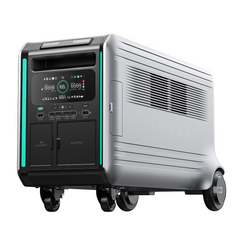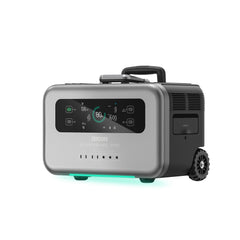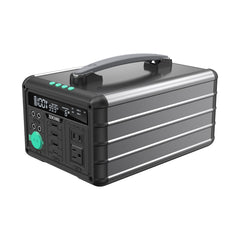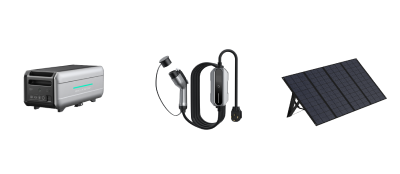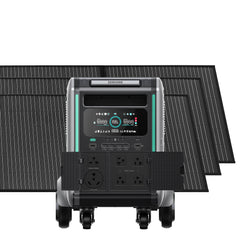Cooking with Solar: Discovering the Benefits of a Solar Generator
In today's modern world, electricity can often be taken for granted; it powers our appliances and simplifies daily tasks. But there may be times when electricity isn't readily available due to a power outage, camping trip, or simply living a more sustainable lifestyle. How to cook without electricity is a sustainable and eco-friendly option for many households. One effective method is using solar generators to power your cooking appliances. In this article, we'll look at the advantages of cooking with solar power, explain how they work, and offer tips and tricks for using one effectively.
Benefits of Using a Solar Generator for Cooking
Solar generators offer an environmentally friendly alternative to traditional fuel-burning generators. One of the advantages of a solar generator is that it can power various appliances, including cookers. In this article, we'll look at some of the advantages of using a solar generator for cooking.
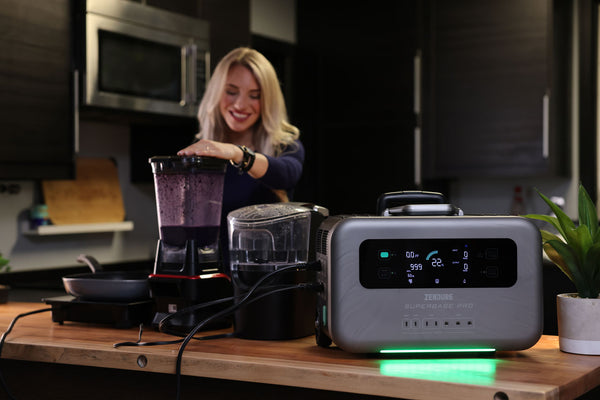
Sustainable and Environmentally Friendly
Solar cooking is an eco-friendly and sustainable option, as fossil fuels do not deplete Earth's resources. By using a solar generator for cooking, you reduce your carbon footprint while helping protect our planet from dangerous greenhouse gas emissions. Furthermore, cooking with solar power eliminates the need for propane or other fossil fuels, contributing to air pollution or respiratory issues.
Cost-Effective
Solar generators are an economical way to power your kitchen appliances. Once purchased, there's no need to pay for fuel or electricity; the sun's energy is free, so you can cook without worrying about costs. Furthermore, these units require relatively low maintainence, so there's no need to spend much on repairs or replacements.
Portability
Many solar generators are designed to be portable, making them perfect for camping or other outdoor activities. You can take your solar generator wherever life takes you and use it for cooking meals without relying on a campfire or other traditional cooking methods.
No Noise Pollution
Solar generators do not produce noise pollution like gas generators do. You can cook in peace without the constant hum of a generator in the background. This makes solar generators ideal for residential areas or other places where noise pollution is an issue.
Easy to Use
Solar generators are user-friendly and don't require any special skills or training to operate. All that needs to be done is set up the generator and connect it to your kitchen appliances. Once connected, the solar energy will begin absorbing from the sun before being converted into electricity which can then be used for powering ovens, stoves, or other cooking tools.
Reliable
Solar generators are reliable and can be used in all kinds of weather conditions. If there's enough sunlight to power the device, you can use it for cooking your meals - making them perfect for areas with intermittent electricity or frequent power outages.
Versatile
Solar generators are incredibly versatile and can be used to power a range of kitchen appliances. Plus, some have built-in USB ports and other features to charge your phone or other devices while cooking! From simple meals to elaborate dishes, solar generators have it all covered.
Reduced Fire Risk
Cooking with solar generators drastically reduces the risk of fires and other accidents. Unlike traditional cooking methods, solar energy does not involve open flames or hot surfaces so you don't have to worry about starting a fire or burning yourself. Plus, solar generators have built-in safety features that guard against overcharging or other electrical hazards.
Understanding How Solar Generators Work for Cooking
Solar generators have grown increasingly popular in recent years as an affordable, environmentally friendly source for cooking. But to get the most out of these powerful appliances, it's essential to understand how they operate and its components.
Components of a solar generator
Solar generators consist of several elements, such as solar panels, batteries and inverters. Solar panels are the most essential component, converting sunlight into usable electricity. The battery stores this generated electricity while the inverter converts its DC form (produced by solar panels) back to AC energy that can power your cooking appliances.
Additional components may include a charge controller, which regulates the flow of electricity from panels to batteries, and an MPPT (Maximum Power Point Tracking) controller that helps optimize solar panel performance.
Gain insight into the power output and capacity of a solar generator
Its components' capacity determines the power output of a solar generator. The solar panel's wattage, battery ampere-hour rating and inverter's wattage all play an important role in determining its output.
The wattage of a solar panel determines how much electricity it can produce. For cooking purposes, 200 watts are recommended. Your battery's ampere-hour rating also affects how long the generator provides power to your cooking appliances; higher ratings indicate longer runtime for these appliances.
The inverter's wattage determines the maximum power that can be supplied to your cooking appliances. It's essential that this figure exceeds that of all appliances being used simultaneously.
Finally, it is essential to comprehend the components of a solar generator and its power output and capacity before using it for cooking. By taking into account these aspects, you can select an appropriate solar generator that meets your cooking requirements while ensuring optimal performance.
Tips and Tricks for Cooking with a Solar Generator
Cooking with a solar generator is an ideal way to enjoy outdoor cooking while reducing your carbon footprint. With these units, you don't need to worry about running out of fuel or harming the environment while enjoying delicious meals cooked without the hustle and bustle. Solar panels convert sunlight into electricity that can then be used for small appliances like electric cookers, rice cookers, and slow cookers. Here are some tips and tricks for cooking with your solar generator.

Optimizing solar panel positioning to receive optimal sunlight
The key to cooking with a solar generator is making sure your panels are positioned for optimal sunlight. This means placing them in an area that receives direct sunlight throughout most of the day. Ideally, these should face south if you live in the northern hemisphere or north if in the southern hemisphere.
If you are cooking outdoors, a portable solar generator with an integrated solar panel is ideal. However, if cooking indoors, extension cords may be needed to connect your panels to the generator. Make sure the panels are placed in an area not shaded by trees, buildings, or other obstacles.
Selecting the appropriate cookware and utensils can be a challenge when cooking
When cooking with a solar generator, it is essential to select the appropriate cookware and utensils. Make sure the cookware matches your cooker type; for instance, electric cookware must be compatible with electric stovetops while slow cookers must match whatever cookware type you are using.
Additionally, opt for lightweight cookware that's easy to handle. Solar generators have limited capacity and heavy pans may need more power to cook food.
Controlling cooking time and temperature
One of the most essential tips when cooking with a solar generator is to manage your cooking time and temperature. Compared to traditional methods, solar cooking requires more patience and planning ahead. Plan your meals in advance and allow extra time for preparation.
Additionally, when cooking with a solar generator you should be mindful of the temperature. Most have an upper limit of 400℉ (204℃), so avoid cooking food above this mark as it could damage the device.
To guarantee your food is cooked thoroughly, use a food thermometer to check its internal temperature. This will allow you to determine whether your dish has reached an appropriate level of readiness and reduce the risk of foodborne illnesses.
Conserving energy during cooking
To guarantee enough electricity for cooking your meals, it's important to conserve power while cooking. Here are some tips for conserving energy:
- Use a Lid: Covering your pan when cooking helps conserve heat and reduce cooking time.
- Preheat Your Cookware: Preheating cookware before beginning a recipe can reduce cooking time and help conserve power.
- Cook in Batches: Cooking in batches helps conserve power by reducing the amount of time your cooker is running.
- Utilize a Slow Cooker: Slow cookers require less power than electric cookers and are perfect for simmering stews, soups, and other delicate dishes that require lengthy preparation.
Select the Appropriate Cookware
Choosing the ideal cookware is essential when using a solar generator for cooking. Choose pots and pans made of dark-colored, non-reflective materials like cast iron, stainless steel, or black anodized aluminum; these absorb heat better and cook meals faster, saving energy.
Utilize a Solar Oven
Solar ovens are an ideal option for cooking with solar generators. They work by reflecting sunlight onto a black container, absorbing heat, and cooking food inside. Solar ovens are best suited to slow-cooked dishes like soups, such as stews or casseroles that require slow heat release.
Plan Your Meals Carefully
When cooking with a solar generator, planning your meals carefully is essential. Solar generators rely on sunlight for power, so plan your meals around when the sun is at its brightest - usually between 10 am and 2 pm.
Use a Solar Grill
Solar grills are another great option for cooking with solar generators. These devices use mirrors or reflective surfaces to direct sunlight onto a cooking surface, perfect for grilling burgers, hot dogs, and vegetables.
Conclusion
Cooking without electricity is an eco-friendly and sustainable option for many households. Solar generators offer a clean, renewable, and cost-effective energy source to cook with. By understanding their components and capacity and following provided tips and tricks, you can utilize this power of solar energy for all of your cooking needs. Remember to position your solar panels for optimal sunlight, select the right cookware and utensils, regulate cooking time and temperature, and conserve power during preparation. With some practice and patience, you can become an expert at solar cooking and enjoy delicious, eco-friendly meals all year.








